WhatsApp is giving users ‘several more weeks’ to agree to a controversial privacy update or risk losing access to the app’s functionality.
Until a few days ago, WhatsApp users had until this Saturday (May 15) to accept the update, which is related to policy changes necessary to allow users to message businesses on the app.
But now WhatsApp has extended the deadline yet again, giving more time to review and accept the policy, it told MailOnline, without giving a specific deadline.
In ‘several weeks’, users who haven’t agreed will start to get ‘persistent reminders’ to do so before functionality becomes limited in steps.
Users who don’t agree to the update after these reminders won’t be able to access their chat list – meaning they won’t have the ability to send and receive messages.
They will still be able to answer incoming phone and video calls and get notifications for a short time, before this capability is eventually taken away too, WhatsApp confirmed.
When it was first announced earlier this year, the policy update sparked fears that WhatsApp would start sharing users’ personal information with its parent company, thanks to a clumsily-worded statement.
Thankfully, WhatsApp has since confirmed that this is not the case.
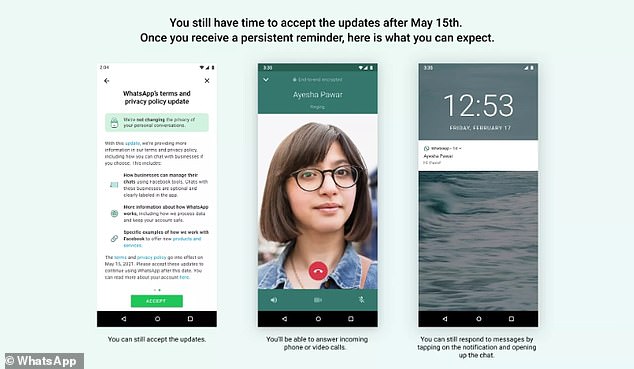
WhatsApp users have just five days to agree to the update before the functionality of the app starts to be taken away from them
‘No one will have their accounts deleted or lose functionality of WhatsApp on May 15th because of this update,’ WhatsApp says in its help centre.
‘After giving everyone time to review, we’re continuing to remind those who haven’t had the chance to do so to review and accept.
‘After a period of several weeks, the reminder people receive will eventually become persistent.’
May 15 is still the effective date of the new policy – so this is the date it comes into effect for users who have agreed to the update.
But for those users who haven’t accepted it yet, WhatsApp is giving them several more weeks to review and accept.
For the last few months, WhatsApp users should have seen an in-app banner allowing them to agree to the update.
The banner, which appears on the WhatsApp landing page where chats are listed, reads, ‘We’re updating our terms and privacy policy. Tap to review.’
Tapping on ‘review’ brings up a deeper summary for users to read through before continuing to the next page, where they can click the big green ‘Accept’ button.
If you don’t recall seeing this banner, not to worry – any user can find out if they have accepted the policy update by requesting their account information.
They can do that by going to the app, going to Settings, Account and then Request Account Info.
‘You can look at the report under the Terms of Service section towards the bottom and see if and when you have accepted the policy,’ a WhatsApp spokesperson said.
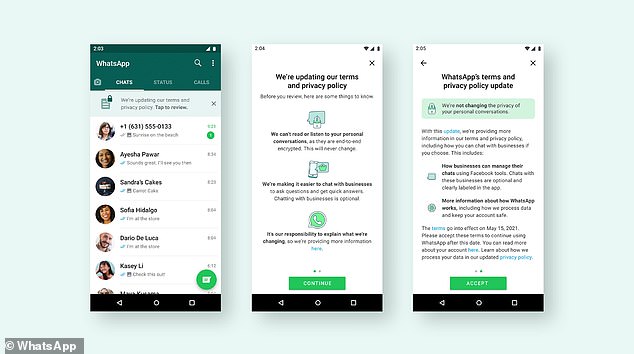
The banner, which appears on the WhatsApp landing page (shown left), reads ‘We’re updating our terms and privacy policy. Tap to review.’ Tapping on ‘review’ will bring up a second page containing a deeper summary (middle). Users who click on ‘more information here’ at the bottom of this second screen (which you can see just above the green ‘Continue’ button) will be taken to a new landing page on the WhatsApp website with more information. Users can accept the terms on the last page (right) by tapping ‘Accept’
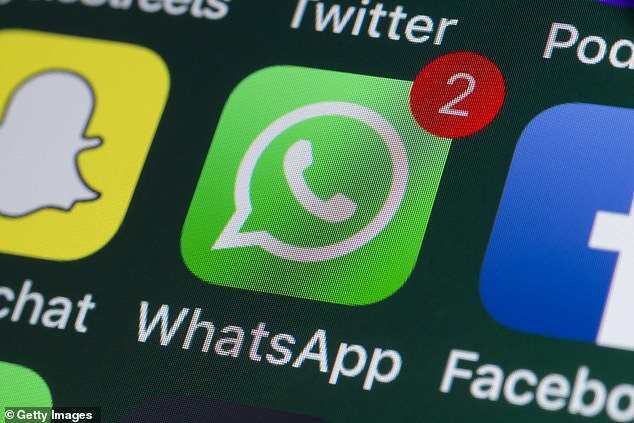
If users don’t agree to the update, they will get ‘persistent reminders’ in ‘several weeks’. After this, the first step of limited functionality is no access to chats. Following this, users won’t be able to receive incoming calls or notifications and WhatsApp will stop sending messages and calls to their phone
Helpfully, WhatsApp has clarified what the changes actually are – and what users are actually agreeing to.
Essentially, users have to agree to allow businesses to store and manage their WhatsApp chats on Facebook.
Businesses are being given the option to use secure hosting services from Facebook to manage WhatsApp chats with their customers, answer questions and send information like purchase receipts.
But there will be no change in data sharing with Facebook for non-business chats and account information.
WhatsApp says: ‘You’ll be able to talk to more businesses on WhatsApp to get things done faster compared to phone or email. This is completely optional.
‘Bigger businesses, like an airline or retailer, might hear from thousands of customers at a time – asking for information on a flight, or trying to track their order.
‘To make sure they can respond quickly, these businesses may use Facebook as a technology provider to manage some of the responses on their behalf.
‘We will clearly label chats to make you aware when that happens.’
When the update was announced in at the start of this year, it was widely misinterpreted, leading to a PR nightmare for the Facebook-owned chat platform.
A backlash was directed at the firm over its confusing announcement of the update, which caused privacy concerns among some users.
The saga goes back to the start of the year – at the beginning of January, WhatsApp started sending full-screen notifications to users to a change to its terms and conditions.
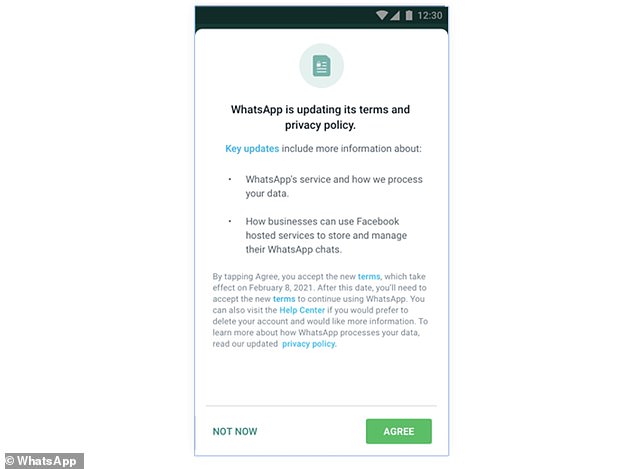
Pictured, the full-screen alert that UK WhatsApp users started seeing in January this year – which caused a furore among WhatsApp users and kicked off a nightmare for the firm’s press department
The alert also said users needed to review and agree to the new terms of service and a privacy policy by February 8 in order to continue using the platform.
The problem was that the alert included incidental information of a data sharing policy with its parent company Facebook that has been in effect since 2016.
The privacy policy said: ‘As part of the Facebook Companies, WhatsApp receives information from, and shares information with, the other Facebook Companies.
‘We may use the information we receive from them, and they may use the information we share with them, to help operate, provide, improve, understand, customise, support, and market our Services and their offerings, including the Facebook Company Products.’
What this means is Facebook can access account information including a user’s phone number, information on how users interact with other users, and logs of how often and how long users use WhatsApp.
Other data that could be shared with Facebook includes IP address, browser details, language and time zone.
However, WhatsApp and Facebook cannot read or listen to personal conversations on WhatsApp, because they’re end-to-end encrypted.
End-to-end encryption ensures only the two participants of a chat can read messages, and no one in between – not even the company that owns the service.
Despite this, upon seeing the wording of the five-year-old data-sharing policy, many WhatsApp users took the drastic step of abandoning the app, thinking they were about to have their personal conversations and the photos within them shared with Facebook staff.
WhatsApp lost millions of users who jumped shipped and started using rival chat apps like Telegram and Signal.
Figures shared by the UK parliament’s home affairs committee on ‘online harms’ showed Signal gained 7.5 million users in the first three weeks of 2021, while Telegram gained a whopping 25 million.
WhatsApp users also took to social media to share their displeasure.
One Twitter user said that he had deleted WhatsApp after coming to see Facebook as a ‘criminal enterprise’.
Following the drama, WhatsApp published a blog post on January 15 to clear up the confusion and ‘misinformation’, and reveal that the deadline for agreeing to the terms and conditions would be pushed back from February 8 to May 15.
WhatsApp also said it saw some of its competitors ‘try to get away with claiming they can’t see people’s messages’ without naming names.
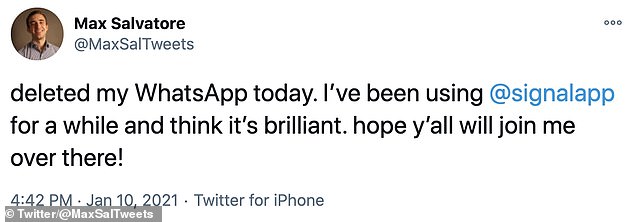
Many frustrated WhatsApp users took to Twitter to announce their departure from the app back in January
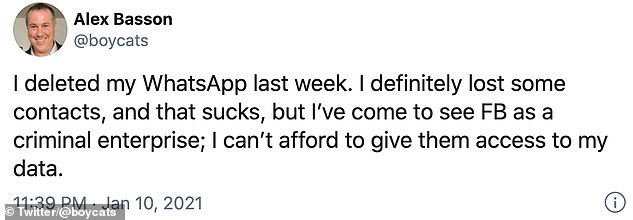
One user said that he had deleted WhatsApp after coming to see Facebook as a ‘criminal enterprise’

The misinterpreted change to WhatsApp’s privacy policy put many users off using the popular messaging app
And in February, WhatsApp announced it would be rolling out the in-app banner where users could agree to the update.
It also started displaying messages in the Status section of the app that declare its commitment to privacy – and its promise that conversations will remain end-to-end encrypted.
Now, months after the debacle, WhatsApp seems to have cleared up the confusion – and pushed back the deadline again for those who are yet to agree.
Another thing to bear in mind is that there is a separate privacy policy for WhatsApp users in Europe and the UK.
This means WhatsApp does not share European region user data with Facebook to improve products or ads – but that is not the case for the rest of the world.
However, all users had to (and still have to) accept the terms as the update applies globally.
